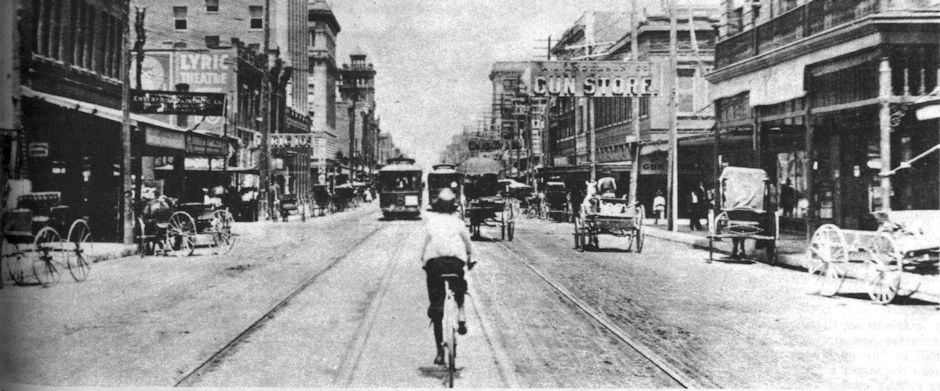James M. “Grude” Britton had been a Texas Ranger in the late nineteenth century.
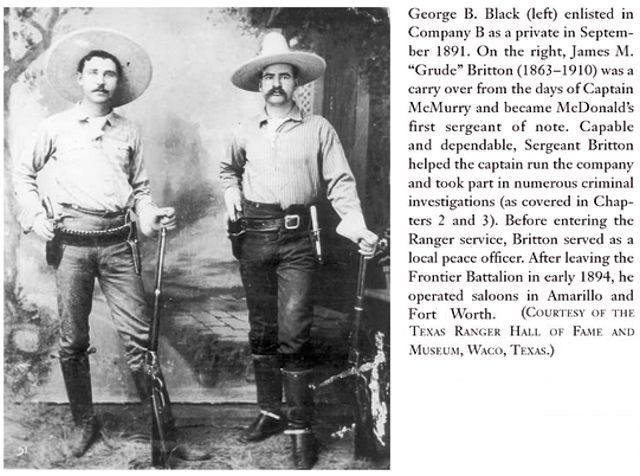 Britton had been a sergeant under Captain Bill McDonald. (Page from Yours to Command: The Life and Legend of Texas Ranger Captain Bill McDonald.)
Britton had been a sergeant under Captain Bill McDonald. (Page from Yours to Command: The Life and Legend of Texas Ranger Captain Bill McDonald.)
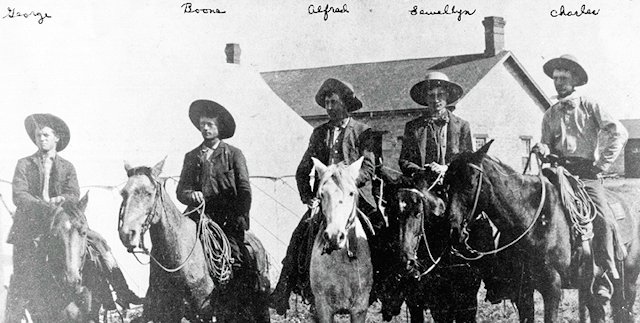 As a Ranger, Britton had faced Marlow brothers George and Charley in Colorado. (Photo from Marlow Area Museum, Marlow, Oklahoma.)
As a Ranger, Britton had faced Marlow brothers George and Charley in Colorado. (Photo from Marlow Area Museum, Marlow, Oklahoma.)
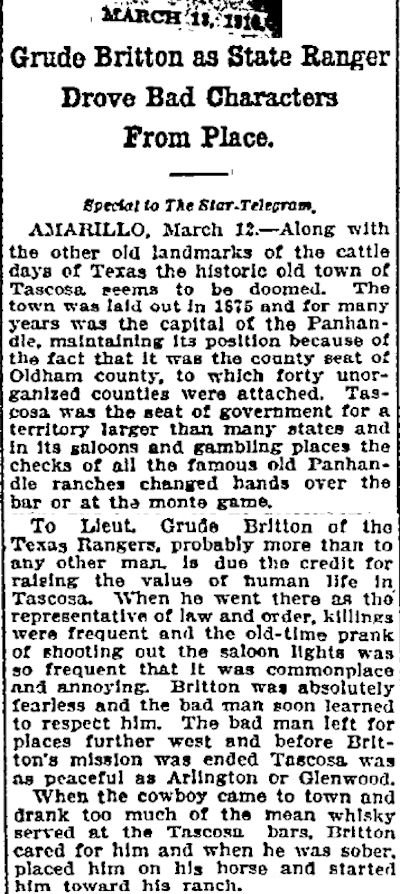 He had kept the peace in Tascosa.
He had kept the peace in Tascosa.
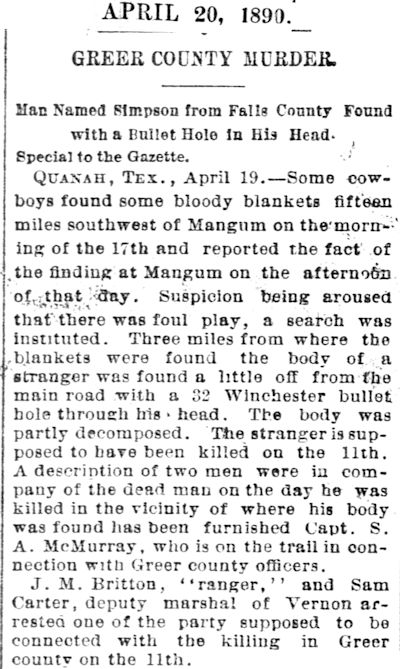 He had helped capture a murder suspect in Greer County.
He had helped capture a murder suspect in Greer County.
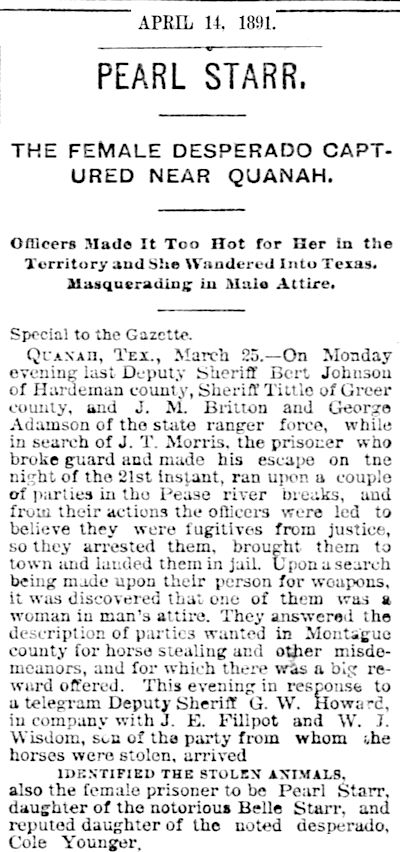 And he had helped capture Pearl Starr, daughter of Belle Starr, in Hardeman County. (Pearl’s father is thought to have been either the outlaw Jim Reed or the outlaw Cole Younger.)
And he had helped capture Pearl Starr, daughter of Belle Starr, in Hardeman County. (Pearl’s father is thought to have been either the outlaw Jim Reed or the outlaw Cole Younger.)
All in all, just another day at the office for Grude Britton.
Grude Britton was, a Ranger superior officer wrote, “cool, conservative, and brave.”
And Grude Britton did not surrender his weapon to anyone. Not even to a police officer.
And that refusal, in the end, would be the death of Grude Britton.
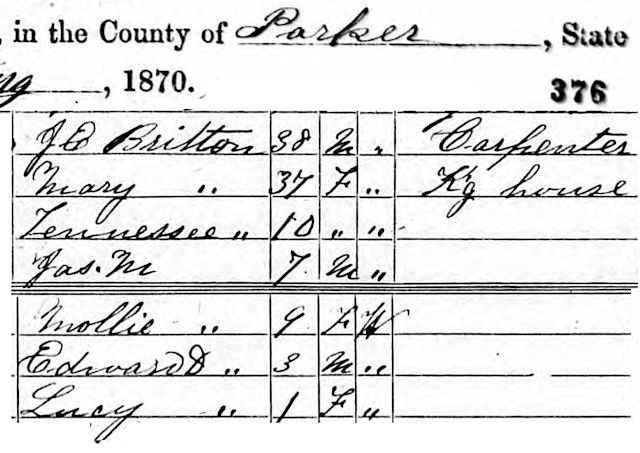 Grude Britton was born in 1863, probably in Parker County. That’s where his family was living in 1870.
Grude Britton was born in 1863, probably in Parker County. That’s where his family was living in 1870.
John W. Buchanan of Fort Worth, who had known Britton since Britton was “a Parker County lad early in the ’80s,” remembered Britton as “absolutely fearless.”
“I saw him one time at Amarillo in the early ’90s go out single-handed to arrest three outlaws of the most desperate type. He had to shoot one down, and that so cowed the others that he brought the living ones in and turned them over to the local authorities. That was at the time when Amarillo was part of the ‘wild and woolly West.’”
Both Grude and brother Ed became Texas Rangers, serving in Company B under first Captain Sam McMurry and then Captain McDonald. Grude also served temporarily as sheriff of Hartley County.
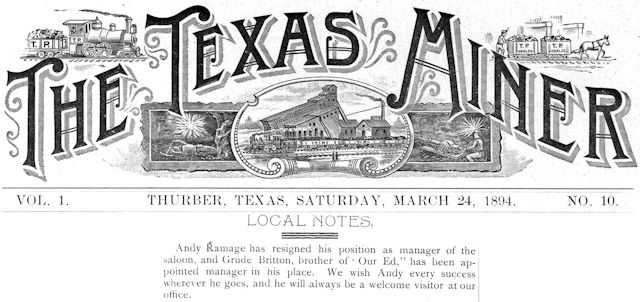 In 1894 Grude traded his badge for a business ledger: He managed a saloon in the thriving brick-and-coal town of Thurber. Brother Ed also left the Rangers and took a job in Thurber. He was hired as weighmaster of the Texas & Pacific Coal Company but eventually became general manager. The Texas Miner was Thurber’s weekly newspaper.
In 1894 Grude traded his badge for a business ledger: He managed a saloon in the thriving brick-and-coal town of Thurber. Brother Ed also left the Rangers and took a job in Thurber. He was hired as weighmaster of the Texas & Pacific Coal Company but eventually became general manager. The Texas Miner was Thurber’s weekly newspaper.
(Watch a silent documentary on the Thurber brick plant from the 1930s.)
 By 1905 Grude was in Fort Worth, managing the bar in the Metropolitan Hotel.
By 1905 Grude was in Fort Worth, managing the bar in the Metropolitan Hotel.
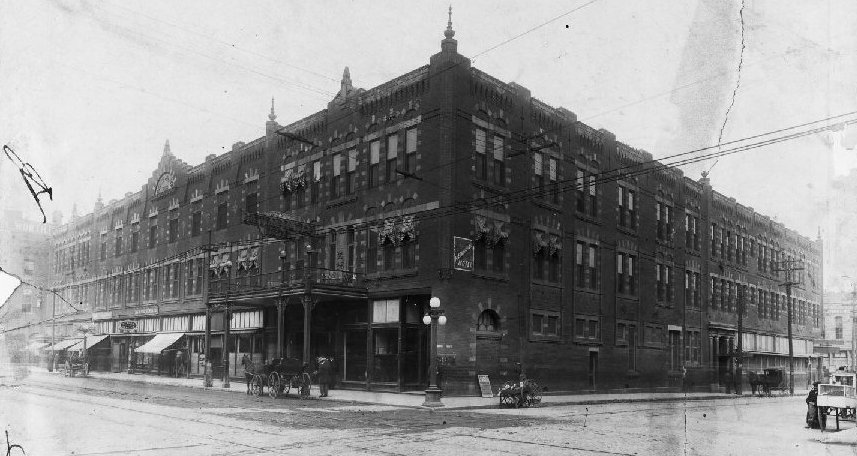 The Metropolitan Hotel (see Part 1) at 911 Main Street had been built by Winfield Scott in 1898 as a haven for visiting cattlemen. “The only European hotel in the city,” the Met boasted, and one of only five first-class hotels among twenty-six in town. Each of the Metropolitan’s guest rooms had an outside view and steam heat. No sooty wood/coal-burning stove for guests at the Met, nosirree.
The Metropolitan Hotel (see Part 1) at 911 Main Street had been built by Winfield Scott in 1898 as a haven for visiting cattlemen. “The only European hotel in the city,” the Met boasted, and one of only five first-class hotels among twenty-six in town. Each of the Metropolitan’s guest rooms had an outside view and steam heat. No sooty wood/coal-burning stove for guests at the Met, nosirree.
By 1905, the year Grude Britton took over the bar at the Met, the hotel had been expanded to a full city block. There was an artesian well in the courtyard, tuxedoed waiters in the dining room, a French chef in the kitchen, and Cowtown socialites in the ballroom. (Photo from University of Texas at Arlington Library.)
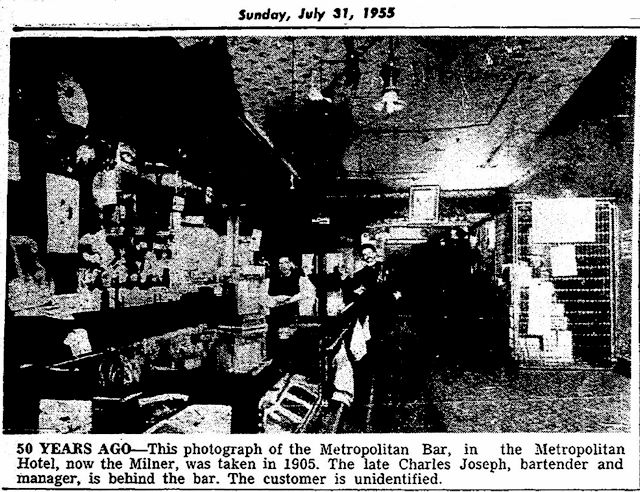 Like the rest of the hotel, the bar of the Metropolitan was first class: carved mahogany and sparkling cut glass and a “magnificent stock of beverages for which the Metropolitan was famous,” the Star-Telegram wrote in 1955. Bartender Charles Joseph, who also had tended bar at the White Elephant, served patrons his five-colored pousse-café cocktail. Joseph’s widow recalled that Britton was often visited at the bar by Captain McDonald. “He often brought us wild turkey and quail from the plains,” she recalled. McDonald was the Texas Ranger to whom the slogan “One riot, one Ranger” was attributed.
Like the rest of the hotel, the bar of the Metropolitan was first class: carved mahogany and sparkling cut glass and a “magnificent stock of beverages for which the Metropolitan was famous,” the Star-Telegram wrote in 1955. Bartender Charles Joseph, who also had tended bar at the White Elephant, served patrons his five-colored pousse-café cocktail. Joseph’s widow recalled that Britton was often visited at the bar by Captain McDonald. “He often brought us wild turkey and quail from the plains,” she recalled. McDonald was the Texas Ranger to whom the slogan “One riot, one Ranger” was attributed.
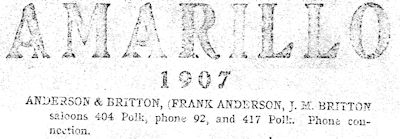 By 1907 Britton had left the Metropolitan to operate two saloons in Amarillo.
By 1907 Britton had left the Metropolitan to operate two saloons in Amarillo.
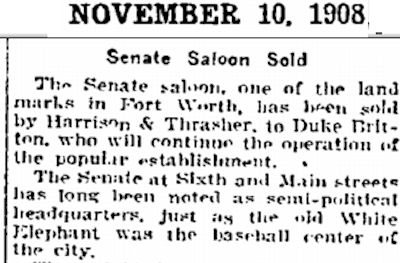

By 1908 he was back in Fort Worth, buying the “landmark” Senate saloon at Main and 6th streets, two blocks north of the Metropolitan Hotel.
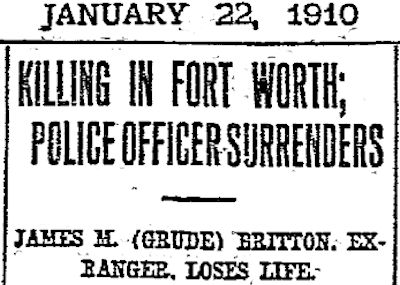 Then came 1910.
Then came 1910.
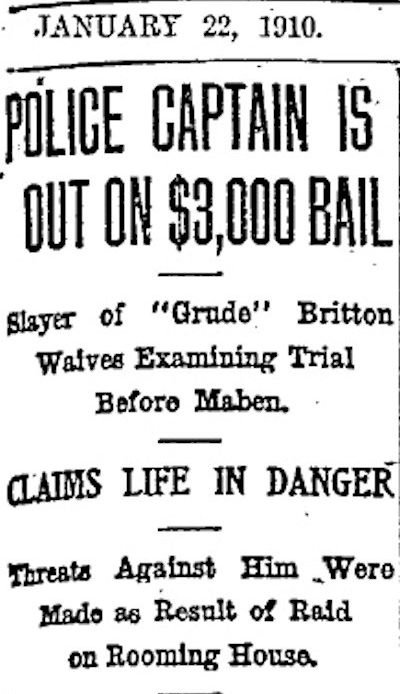 Grude Britton was fatally shot by Fort Worth police Captain Tom Blanton. Britton’s death came at the intersection of four forces: accusations by the proprietor of a reputed brothel, threats by Britton, a raid by police, and a preemptive strike by a lawman.
Grude Britton was fatally shot by Fort Worth police Captain Tom Blanton. Britton’s death came at the intersection of four forces: accusations by the proprietor of a reputed brothel, threats by Britton, a raid by police, and a preemptive strike by a lawman.
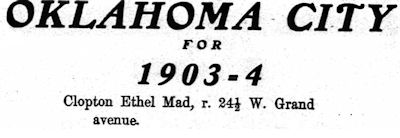 The proprietor of that reputed brothel was Ethel Clopton, who in the 1890s had operated the Vendome, the plushest brothel in Oklahoma City—located across from city hall. In 1902 she lived on West Grand Avenue in the Battle Row area, Oklahoma City’s answer to Cowtown’s Hell’s Half Acre, a red-light district of saloons, gambling halls, and “female boarding houses” (brothels).
The proprietor of that reputed brothel was Ethel Clopton, who in the 1890s had operated the Vendome, the plushest brothel in Oklahoma City—located across from city hall. In 1902 she lived on West Grand Avenue in the Battle Row area, Oklahoma City’s answer to Cowtown’s Hell’s Half Acre, a red-light district of saloons, gambling halls, and “female boarding houses” (brothels).
 By 1909 Ethel Clopton was in Fort Worth, proprietor of the Amarillo Hotel on Jennings Avenue just three blocks south of our city hall, where the police station was located. The Amarillo was on the western fringe of Hell’s Half Acre and, historian Oliver Knight wrote, was “a well-known disorderly house” (brothel). (Julian Campbell Clopton, relation to Ethel—if any—unknown, would buy the Metropolitan Hotel in 1914.)
By 1909 Ethel Clopton was in Fort Worth, proprietor of the Amarillo Hotel on Jennings Avenue just three blocks south of our city hall, where the police station was located. The Amarillo was on the western fringe of Hell’s Half Acre and, historian Oliver Knight wrote, was “a well-known disorderly house” (brothel). (Julian Campbell Clopton, relation to Ethel—if any—unknown, would buy the Metropolitan Hotel in 1914.)
Ethel Clopton was a friend of Grude Britton, and her Amarillo Hotel also happened to be Grude Britton’s place of residence. Perhaps Ethel Clopton benefited from the presence of an ex-Texas Ranger at her establishment.
Early on January 21, 1910 Mrs. Clopton complained to Police Chief June Polk that Captain Tom Blanton had come to her hotel the night before and had fired a gunshot through the door. She made threats about what Grude Britton would do if she were molested. Chief Polk quickly determined that Blanton had been nowhere near the Amarillo Hotel at the time in question. Chief Polk, who knew that the Amarillo Hotel had the reputation as a disorderly house, assigned three other officers to stake out the hotel and to watch for anything of a “compromising nature.”
About 3 p.m. Britton walked into the office of Chief Polk and said of Captain Blanton, “If you don’t fire that –––, I’ll kill him.”
After Britton left, Polk had Britton’s threat relayed to Blanton. Later in the day Polk had Britton brought in for a talk. Britton assured Polk that he had meant nothing by his earlier threat.
But then early in the evening the three officers watching the Amarillo Hotel conducted a raid and arrested Mrs. Clopton and three female residents for vagrancy (prostitution).
Britton learned of the arrests and went back to city hall about 7:20 p.m. Police Sergeant C. W. Newby later testified that Britton asked to see Blanton, who had not yet arrived for night duty. In the presence of several police officers and an attorney Britton again made threats against Blanton.
Sergeant Newby said he grappled with Britton to disarm him and found a large Colt revolver in Britton’s right hip pocket.
“I started to take the gun,” Newby testified, “when he pulled out a paper which he said was his commission as a Ranger” allowing Britton to carry a weapon. Newby said he started to take the pistol anyway but was advised not to by a detective sergeant. Britton calmed down and left the station.
About 8:30 p.m. Britton met Captain William Lightfoot, a friend from Thurber, at the corner of Main and 7th streets. Britton told Lightfoot that he was on his way to city hall to provide bond for the women arrested in the raid on the Amarillo Hotel. Lightfoot later testified that Britton asked him to accompany Britton to city hall “to show them [police] that he didn’t want to cause any trouble.” Lightfoot said he saw Britton with his coat thrown back and saw no gun. Nonetheless, as the two men walked to city hall, Lightfoot slipped his left arm around Britton’s right arm, as if to constrain Britton’s gun hand.
By that time Captain Blanton had arrived at city hall and was in self-preservation mode. He knew about the threats made by Britton and probably knew that Britton had not surrendered his weapon to Sergeant Newby. Blanton later recalled that as he watched Lightfoot and Britton walk toward him at the south entrance to city hall, “They must have recognized me at the same time for they stopped. Britton had his right hand in his coat pocket and started to pull it out when I fired three times as fast as I could.”
Lightfoot later said that he saw that Blanton was holding a pistol as Lightfoot and Britton approached Blanton: “When I saw the pistol I held up my right hand and said, ‘He’s not here for trouble.’”
Too late. Britton was shot twice. The third bullet shattered a window glass of streetcar no. 155 on the University line (to Fort Worth University).
After Britton was shot, Lightfoot later said, “I eased him to the ground with my arm still linked in his.”
The Dallas Morning News said Britton had only “the magazine of a .38-caliber automatic pistol in his hip pocket at the time of [the] shooting.”
Britton lived only five more minutes. His body was taken across the street to Louis P. Robertson’s funeral home.
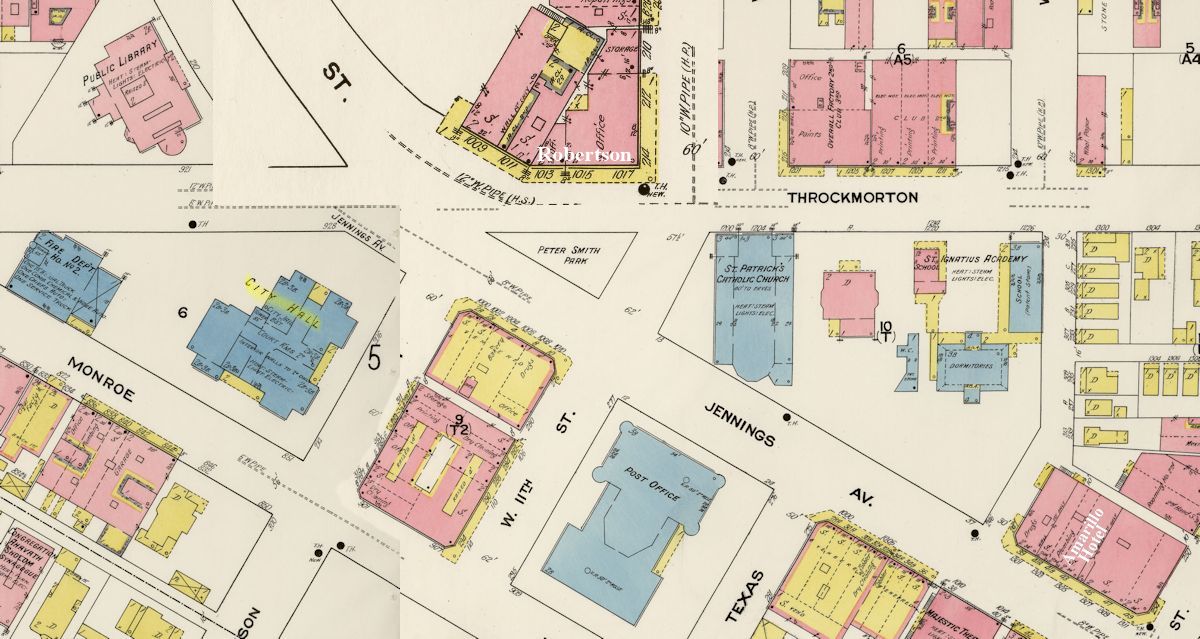 The events of January 20-21 took place in a three-block area. The Amarillo Hotel was on the right. City hall was on the left, near the federal building/post office, Carnegie library, central fire station, original Majestic Theater, telephone building, and St. Patrick and St. Stanislaus. Robertson’s funeral home was just southeast of city hall.
The events of January 20-21 took place in a three-block area. The Amarillo Hotel was on the right. City hall was on the left, near the federal building/post office, Carnegie library, central fire station, original Majestic Theater, telephone building, and St. Patrick and St. Stanislaus. Robertson’s funeral home was just southeast of city hall.
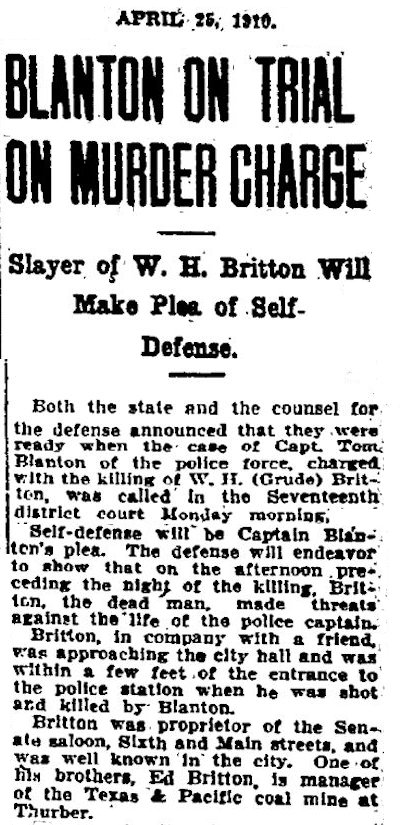 After the shooting, Chief Polk said there would be no departmental investigation. “We feel that Captain Blanton was justified in believing his life [was] in danger.”
After the shooting, Chief Polk said there would be no departmental investigation. “We feel that Captain Blanton was justified in believing his life [was] in danger.”
Nonetheless, a grand jury indicted Blanton for murder.
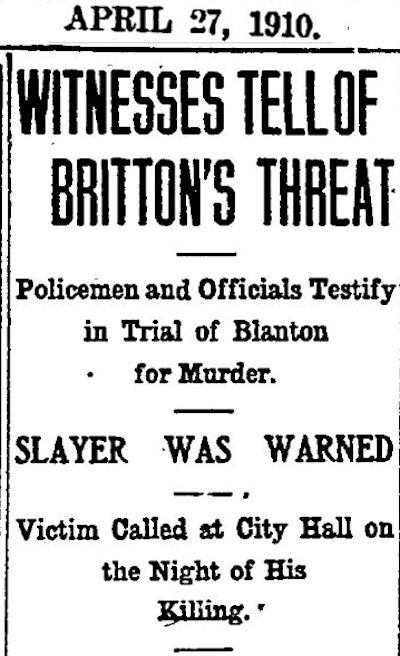 At his trial Captain Blanton testified that he had shot Britton in self-defense because he had feared for his life. Witnesses testified that Britton indeed had threatened to kill Blanton.
At his trial Captain Blanton testified that he had shot Britton in self-defense because he had feared for his life. Witnesses testified that Britton indeed had threatened to kill Blanton.
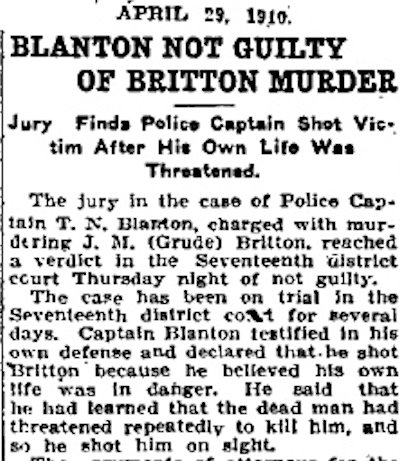 After four days of testimony and deliberation, the jury found Captain Tom Blanton not guilty.
After four days of testimony and deliberation, the jury found Captain Tom Blanton not guilty.
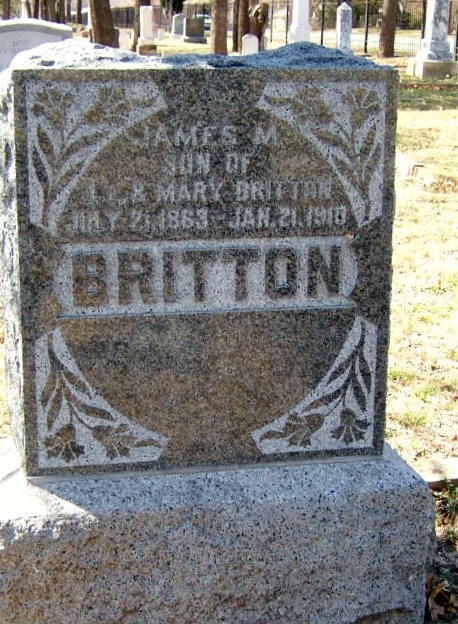 Texas Ranger James M. “Grude” Britton, who traded his badge for a business ledger and managed the bar of the Metropolitan Hotel, was taken back to where he had been “a Parker County lad early in the ’80s” for burial.
Texas Ranger James M. “Grude” Britton, who traded his badge for a business ledger and managed the bar of the Metropolitan Hotel, was taken back to where he had been “a Parker County lad early in the ’80s” for burial.
The Metropolitan Hotel: Mahogany and Homicide (Part 1)
The Metropolitan Hotel: Mahogany and Homicide (Part 3)
Posts About Crime Indexed by Decade
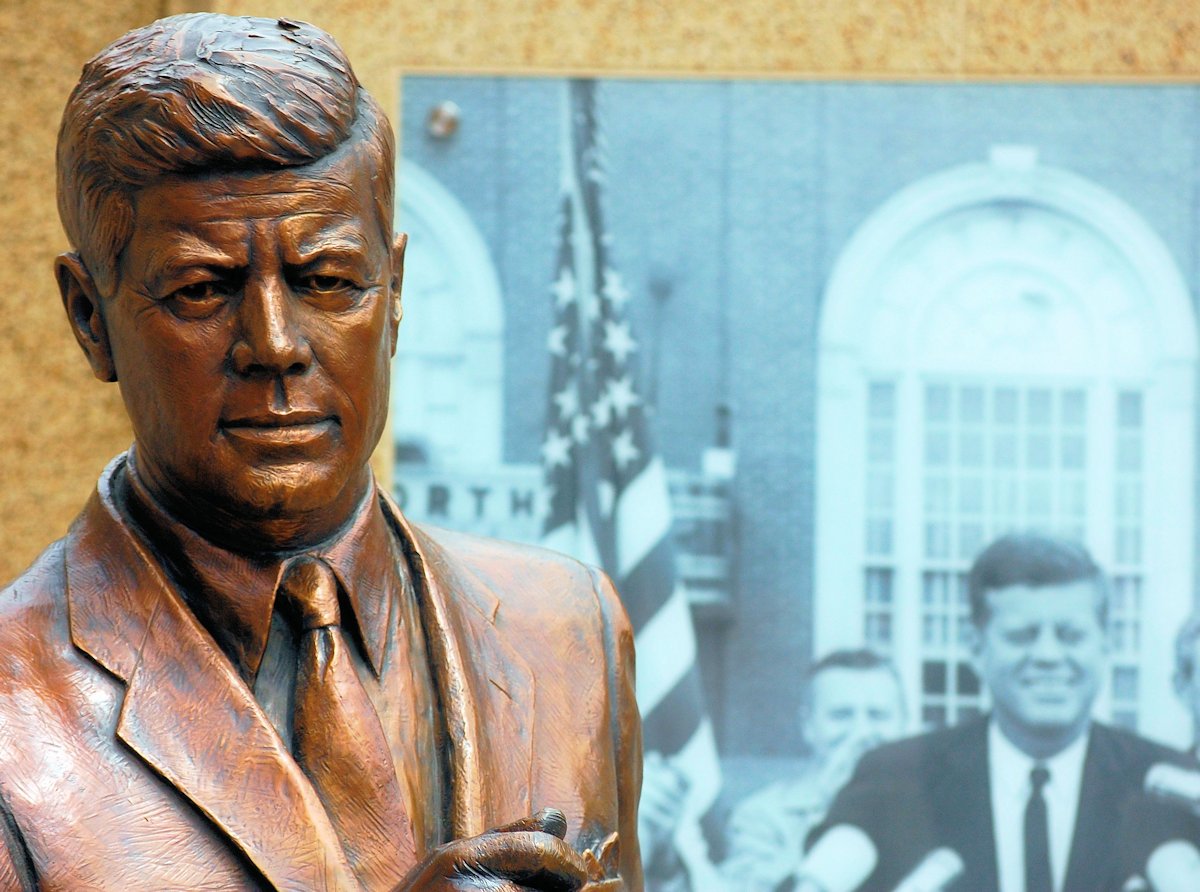 November 22 footnote: The site of the Metropolitan Hotel, just south of the Hotel Texas, today features on General Worth Square a statue of perhaps Fort Worth’s best-remembered hotel guest.
November 22 footnote: The site of the Metropolitan Hotel, just south of the Hotel Texas, today features on General Worth Square a statue of perhaps Fort Worth’s best-remembered hotel guest.
